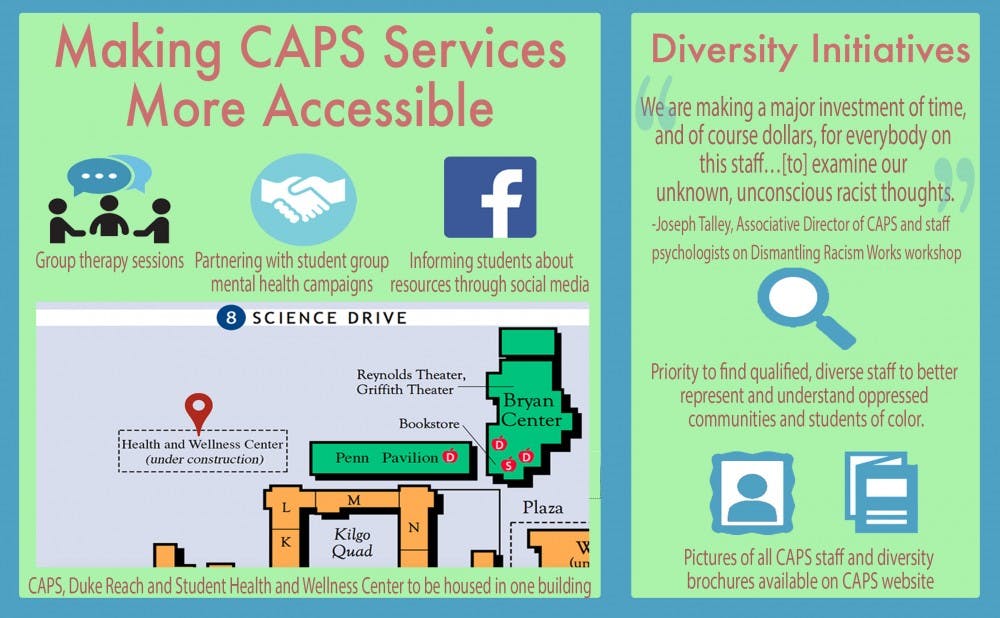Improving staff diversity at Counseling and Psychological Services is still a work in progress.
During a community forum in November 2015, students noted that access to services in CAPS was limited and that there was a lack of diversity in the department. Director Danielle Oakley said CAPS is working on meeting the needs of underserved and underrepresented populations by being engaged on campus and offering clinical programs.
“[Access] is a common problem in counseling centers across the country,” Oakley said. “Our goal is to try to get students in within five days of them calling for an appointment, and that is a priority for us.”
Junior Khalouk Shahbander—president of Duke's chapter of the National Alliance on Mental Illness—expressed in an email that NAMI's biggest concern with CAPS is students’ perception of it.
“Students are not completely aware of where CAPS is, or that it's free; some worry that visiting CAPS will certainly affect their academic standing,” Shahbander wrote.
Another challenge CAPS is trying to tackle, Oakley said, is diversity. She said CAPS will make it a goal to find qualified staff to represent marginalized communities and students of color.
“Really digging into the psychological and social impact of racism and other discrimination is going to be important for us because that actually negatively impacts mental health,” Oakley said. “So we want to make sure that we take a stand on the campus and say that everyone on campus needs to take a look at their thoughts and their actions.”
Two new permanent psychologists have been added this Fall—Marvice Marcus and Greg Welikson, who were both interns last year. Marcus has experience working with black students and on social justice issues, and Welikson integrates multicultural perspectives into his counseling.
Making Marcus and Welikson permanent staffers came as some former employees left. Among them were Gary Glass, associate director of outreach and developmental programming, and Interim Director Libby Webbs.
Associate Director Joseph Talley noted that CAPS is currently in the midst of multiple searches for new staff members, which have been in progress since last year. These searches take about a year due to the difficulties of conducting a thorough, national search, Talley said, noting that CAPS does aim to add new staff next year.
CAPS is taking other actions as well to address diversity, including releasing diversity brochures and adding pictures of all staff members to the website.
“I think our diversity is more evident with the pictures,” Talley said.
CAPS is also providing skill-based workshops for staff psychologists, such as Dismantling Racism Works, which examines racism in the United States and the history of oppression. The workshop will likely last a couple of years, Talley said.
“We are making a major investment of time, and of course dollars, for everybody on this staff to examine our unknown, unconscious racist thoughts,” he said.
Talley said that CAPS has improved regarding its ease of access, noting an increase in the number of students they have seen this year.
“[Waiting time] continues to get reduced, and it gets reduced by how we change our total system,” he said. “We’ve ramped up the number and percentage of students we see. We have busted 14 percent [of the student body].”
To combat problems with access, CAPS has been focusing on group therapy sessions to improve interpersonal relationships and help students find connections with their peers. CAPS is also looking to partner with student groups on campus conducting mental health campaigns, Oakley said.
“We’re also looking at how to help students have better access to clinical services and enhancing our focus on group therapy services to help students be in groups so they don’t feel like they’re so alone on campus,” Oakley said.
CAPS will be moving from its location in the Flowers Building to the Student Health and Wellness Center, which is currently undergoing construction but is expected to be completed by January 2017. The new center will also house DukeReach, which helps direct students to University resources.
“I liked that there was a colocation of the Student Health service and Wellness and DukeReach with CAPS,” Oakley said. “I think that all of [our] work is strengthened when we can all work together collaboratively.”
Other steps to promoting student engagement include a greater social media initiative on platforms such as Facebook.
“The things students bring to us as their concerns become our concerns,” Talley said. “We hear it when a student is out there. We are student-funded. We answer to you basically.”
Get The Chronicle straight to your inbox
Signup for our weekly newsletter. Cancel at any time.

